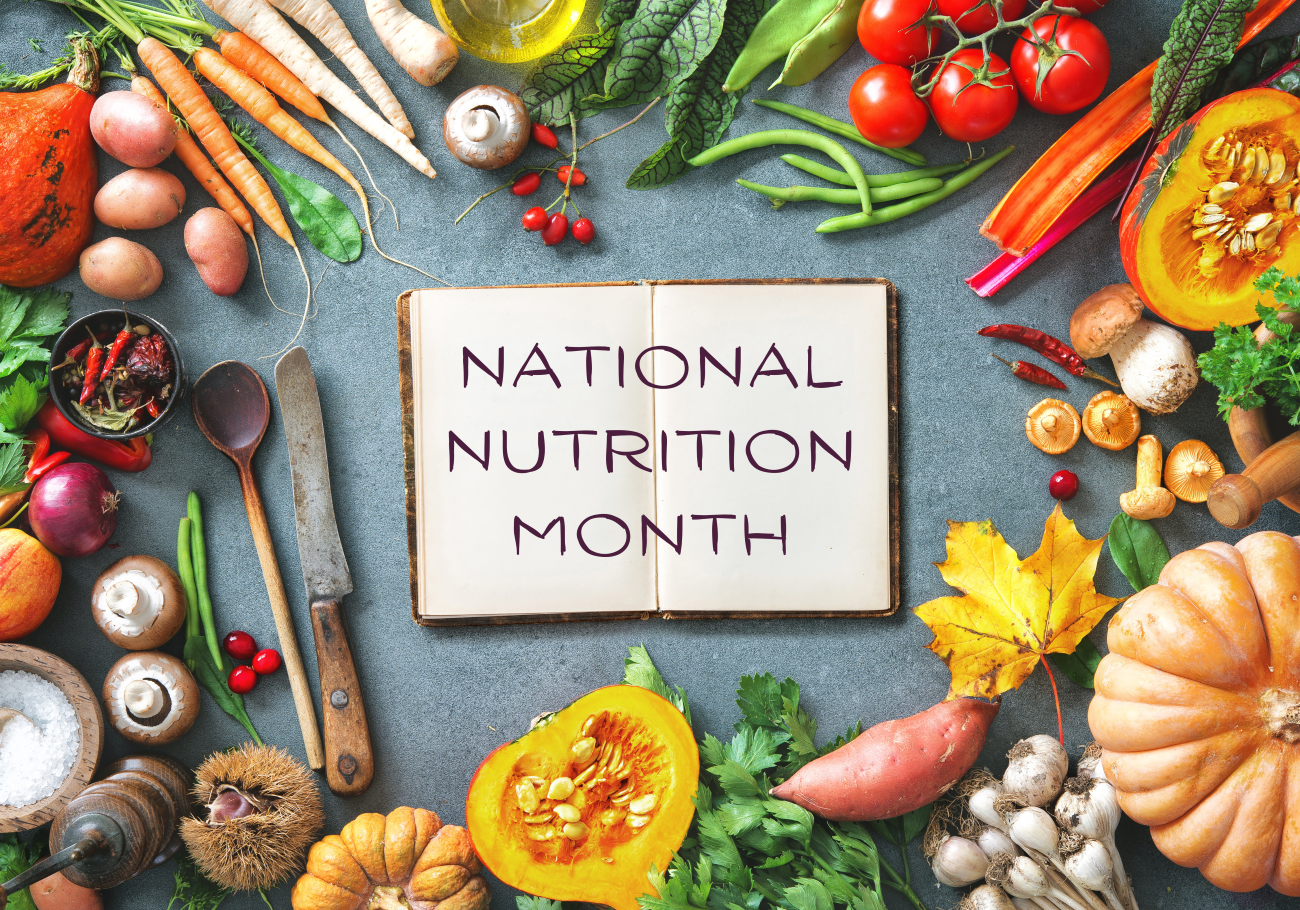Nutrition Month
Lorna Fedelem MD • January 31, 2025
Nutrition Month

National Nutrition Month, celebrated every March, was established by the Academy of Nutrition and Dietetics to promote informed food choices and healthier eating habits. Understanding nutrition is crucial as it affects every aspect of our lives, from physical health to mental well-being. A balanced diet rich in essential nutrients supports growth, maintains a healthy weight, and reduces the risk of chronic diseases like heart disease, diabetes, and cancer.
Embracing Whole Foods
One of the foundations of healthy eating is embracing whole, minimally processed foods like fruits, vegetables, whole grains, lean proteins, and healthy fats. These foods provide the necessary nutrients and fiber that support overall health. Unfortunately, many Americans consume ultra-processed foods, which are far removed from their natural sources. Choosing whole foods over processed alternatives maximizes nutritional benefits.
Balance and Moderation
Healthy eating is about balance and moderation, not strict rules or deprivation. Instead of restrictive diets, focus on variety and practice portion control. Satisfying occasional cravings in moderation prevents feelings of deprivation, making healthy eating more sustainable.
Reading Food Labels
Learning to read food labels is essential for making informed choices. Pay attention to serving sizes, calorie counts, and ingredient lists. Choose foods with fewer ingredients you recognize and those lower in added sugars, unhealthy fats, and sodium.
Cooking at Home
Cooking at home provides control over ingredients and cooking methods, making it easier to choose healthier options. Experimenting with new recipes and seasonal produce can help you create flavorful dishes without relying on excessive salt or sugar.
Mindful Eating
Mindful eating involves paying attention to hunger and fullness cues and savoring each bite without distractions. By eating slowly and listening to your body’s signals, you can prevent overeating and promote better digestion.
Staying Hydrated
Hydration is essential for health, supporting digestion, metabolism, and cognitive function. Drink plenty of water and include hydrating foods like fruits, vegetables, and herbal teas. Limit sugary drinks and prioritize water as your primary source of hydration.
Seeking Professional Guidance
If you have specific health goals or dietary concerns, consider consulting a registered dietitian or nutritionist. They can offer personalized advice and help you make sustainable changes to your eating habits.
Being Flexible and Adaptable
Healthy eating is a journey, not about perfection. It’s important to be flexible and focus on progress rather than stressing over occasional slip-ups. Embrace small changes and celebrate your successes along the way.
Making Healthy Eating a Priority
Healthy eating is an essential aspect of self-care. Nourishing your body with nutrient-rich foods supports your overall health and vitality. Every positive food choice you make contributes to your long-term well-being.
National Nutrition Month is a great time to evaluate your eating habits and make positive changes. Call Dr. Lorna Fedelem’s office today and schedule a consultation with our new Nutritionist Andrea Cantone. She has years of experience helping clients meet their weight loss and fitness goals.

Many people set New Year’s resolutions to improve their health, but these resolutions often fail due to unrealistic expectations or vague goals. To improve your chances of success, it’s important to set specific, attainable objectives and take small, manageable steps that can easily become part of your routine. Here are six practical and achievable health-related resolutions to help you stay on track throughout the year. 1. Lose Weight and Keep It Off Losing weight is a common New Year’s resolution, but it’s important to approach it with patience. Rather than opting for quick fixes or fad diets, focus on gradual and sustainable weight loss. Aim for losing one to two pounds per week, a healthy pace that is more likely to lead to long-term success. Pair a balanced diet with regular physical activity and focus on making lasting lifestyle changes. Consistency and persistence are essential to keeping the weight off and maintaining a healthy body over time. 2. Eat a Healthy Diet Eating a nutritious diet is key to overall health. Start by incorporating more fruits, vegetables, whole grains, and lean proteins into your meals. Foods high in fiber, such as fruits and vegetables, help you feel fuller for longer, which can reduce the chances of overeating. Mindful eating is another important aspect—slow down and savor each bite, allowing your brain time to recognize when you’re full. 3. Sit Less, Move More Committing to a full workout routine can be intimidating, especially for beginners. Instead of focusing only on formal exercise, aim to increase your daily movement. Small changes, like parking farther away from the store, taking the stairs instead of the elevator, or stretching during TV breaks, can add up to significant increases in physical activity. These small adjustments can help you become more active and, as you gain confidence, you may feel inspired to incorporate more structured exercise into your routine. 4. Schedule an Annual Checkup Good health isn’t just about diet and exercise—it also involves regular medical checkups. Scheduling an annual visit with your healthcare provider allows you to catch potential health issues early. Even if you feel healthy, it’s essential to schedule screenings and other health assessments. This yearly checkup is also an opportunity to discuss any concerns with your doctor and stay proactive about your well-being. 5. Take Steps to Reduce Stress Chronic stress can have a negative impact on both mental and physical health, making stress management essential. Incorporating stress-reduction techniques like deep breathing, mindfulness meditation, or short walks can help lower stress levels. Taking even a few minutes each day to relax can help you build resilience and improve your ability to handle challenges. A balanced approach to managing stress will enhance both your mental and physical well-being. 6. Get More Sleep Adequate sleep is crucial for both physical recovery and mental clarity. Create a calming bedtime routine, reduce screen time before bed, and ensure your sleep environment is quiet and comfortable. If you continue to have trouble sleeping, consulting a healthcare provider may help you identify solutions. How to Stick to Your Resolutions Setting resolutions is just the first step; staying committed requires consistency. Make your goals specific and realistic, breaking them into smaller, achievable steps. Track your progress with tools like fitness apps or journals, and celebrate milestones along the way. Remember that perfection isn’t the goal—if you slip up, simply refocus and keep moving forward. By making small, consistent changes, you’ll be on your way to a healthier, happier year









Share On: